“All children need a place to play. They need space, informality and freedom. Disabled children need this freedom even more than others. In surroundings which stimulate their imagination, and challenge them to face and overcome risks. Disabled children need a world where they belong, where they can play and escape with their mates.”
Lady Allen of Hurtwood

KIDS National Development Department was formerly part of Kidsactive which merged with KIDS in 2003. Kidsactive promoted inclusive play through training, information and publications, and ran six adventure playgrounds in London.
Kidsactive (previously known as HAPA) was founded in 1966 by Lady Allen of Hurtwood, one of the pioneers in the field of adventure play.
Marjory Allen, (10 May 1897 – 11 April 1976), was an English landscape architect and promoter of child welfare.
In 1921 she married Clifford Allen, a leading member of the Independent Labour Party who had been imprisoned as a conscientious objector in World War I. Marjory Allen worked as a landscape architect throughout the 1920s and 1930s and was elected the first fellow of the Institute of Landscape Architects in 1930.
Clifford died in 1939, and Lady Allen threw herself into her work, also becoming interested in the welfare of children. Her campaigning for children in institutional care led to the passing of the Children Act 1948. She was chairman (1942–1948) and president (1948–1951) of the Nursery School Association of Great Britain, founder president of the World Organisation for Early Childhood Education, a member of the Central Advisory Council for Education (1945–1949), and chairman of the Advisory Council on Children’s Entertainment Films (1944–1950). After World War II she served as a liaison officer with UNICEF in Europe and the Middle East.
She campaigned for facilities for children growing up in the new high-rise developments in Britain’s cities and wrote a series of illustrated books on the subject of playgrounds, and adventure playgrounds, spaces for free creativity by children, which helped the idea spread worldwide.
There are many resources on the web which promote Lady Allen’s work and provide a legacy of her fight for disabled and non-disabled children to have the right to play together freely. Here are just a few.
Lady Allen of Hurtwood Memorial Trust – www.ladyallentrust.org
The Trust exists to encourage and promote the welfare and education of young children and their families, particularly those who are disabled or deprived and to continue work that is in the spirit of enterprise inspired by Lady Allen.
Applications are invited from candidates with a scheduled travel project in mind. They must offer full details of how the award will help them to gain specific knowledge and experience, which will enhance the quality and nature of their work with young children and their families.
Planning for Play (Lady Allen of Hurtwood, 1968) – www.play-scapes.com
This seminal work is now available as a downloadable pdf courtesy of Playscapes.
Adventure Play. Early Pioneers – www.adventureplay.org.uk
In considering Lady Marjory Allen’s lifetime, one realises that it would take most people numerous lifetimes to accomplish even a proportion of her achievements, a few are listed here with links to other archives.
Video footage of Lady Allen – http://rethinkingchildhood.com
Uploaded by London Play, and blogged by Rethinking Childhood. This video focuses on the staffed adventure playgrounds Lady Allen created in the 1960s and 1970s to provide play opportunities for disabled children.
‘children are more complicated than kettles’ the life and work of Lady Allen of Hurtwood – http://theinternationale.com
A personal account from a Playworker, brings vividly to life the work of Lady Allen.
University of Warwick. Records of Lady Allen of Hurtwood – www2.warwick.ac.uk
The Modern Records Centre lists all the material they hold relating to Lady Allen.
Play Wales “Better a broken bone than a broken spirit” – www.playwales.org.uk
A specially commissioned t-shirt celebrating children’s right to play is available from Play Wales, the quote is attributed to Lady Allen.
 KIDS NationaI Development Department has produced a wealth of material over the past 10 years, however as governments, initiatives and policy changes, some of the archive material has become dated and may not reflect current practice.
KIDS NationaI Development Department has produced a wealth of material over the past 10 years, however as governments, initiatives and policy changes, some of the archive material has become dated and may not reflect current practice.
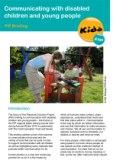

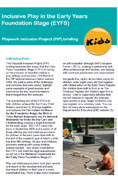
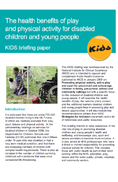
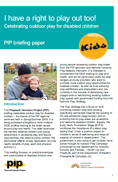

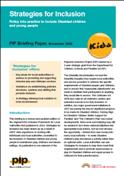

You must be logged in to post a comment.